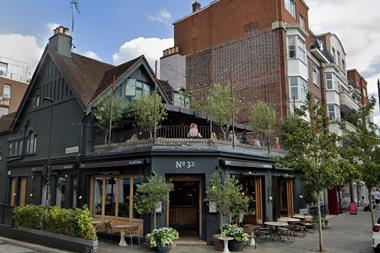The retail sector has suffered at the hands of a consumer spending slowdown in the last six months, and bulky goods retailers have been hit hardest.
Traditional out-of-town retailers face the threat of high street competitors expanding into the out-of-town sector, and the make-up of retail parks is changing almost weekly.
There is a stark contrast between those struggling and those expanding. B&Q is considering job cuts and earlier this month out-of-town furniture retailer Klaussner asked landlords for a rent restructuring. Meanwhile, Debenhams is poised to sign for its first full-range department store on a retail park.
The clampdown on mezzanines is imminent and has led many retailers to speed up out-of-town expansion programmes. Property directors at retailers are under pressure to cut property costs as investors send rents soaring.
Laura Chesters talks to five of them to see how they are coping
Dixons, with 8m sq ft (743,220 sq m) of retail space, has been forced to cut £30m in costs.
Property director Martin Meech has almost three decades of experience as a property director, including time at Halfords and Gateway. He is liked and well known in the property industry, despite a reputation for bemoaning the lack of understanding in the property industry of what is happening in retail.
Meech is a mediator between the retail and property industry. He says: ‘I’m the bloke between the retail and property industry: I have a foot in both camps. The three challenges for a property director are the retail market and property market to realign, for the old tenant relationship to evolve, and the planning and development hurdles.’
He is taking action on this front as one of the leading members of the new Property Owners’ and Occupiers’ Forum that has been set up to improve on the traditionally antagonistic relationship between landlords and tenants.
Meech is clear the property market will be forced to listen to retailers.
He says: ‘The things that annoy tenants are the obstacles and the bureaucracy that are in the way when dealing with landlords. While retailers have needed to get space, we have accepted this. But as things change and fewer retailers want space, retailers may not accept it any longer.’
Landlords warn that the demands by tenants may backfire. Chris Taylor, portfolio manager at Prudential, says: ‘Long-term investors have always fulfilled an important role by funding developments. The more we tinker around with terms of leases, the more we are in danger of upsetting the status of property as an asset class. This may result in the lack of appetite for funding new space.’
Meech and the Dixons aim to stay ahead by cutting costs and trialling new concepts for stores. This all means a new era for Dixons, to be renamed DSG International, and busy period ahead for Meech.
The challenges are for the retail market and property market to realign and the old tenant relationship to evolve
Martin Meech, Dixons
Terry Hartwell is Kingfisher Group property director, on the main board and responsible for not only the UK but the business’s expansion in China, Europe and Russia.
B&Q in the UK is a mature business with 346 stores, and his place on the main board highlights the importance of property for the business.
Hartwell says: ‘We have always been an aggressive, expanding business and even as growth slows down, the property becomes incredibly important to manage. It is unusual for a property director to be on the main board, but property is a key part of any retailer’s growth.’
Hartwell, like Meech, is a vocal figure in the industry and is convinced landlords and retailers must work together.
Hartwell says: ‘With cost pressures and price deflation, and now consumer spending being down, everything is against retailers. If it weren’t for upward-only rent reviews, our rents would have had to go down. There is pressure for rents to fall, and if this doesn’t happen retailers will go to the wall and then rents will have to fall anyway.’
Hartwell realises he is painting a bleak picture, but he believes retailers will have to be smarter and landlords will have to listen.
B&Q has changed strategy and for the meantime will open more of its smaller stores than ever. Hartwell has been around long enough to know this is not the first time things have been this bad for retailers, but he thinks some might be seeing it for the first time.
There is pressure for rents to fall, and if this doesn’t happen retailers will go to the wall
Terry Hartwell, Kingfisher
Hartwell says: ‘We have had double-digit growth for 10 years in a row at B&Q, and that is now under threat. There will be some people who have never known anything different, but in 1994 things were also very bad. We are experiencing a different climate now in retailing, and controlling costs is what retailers are forced to do.’
B&Q is embarking on residential developments next to stores. Hartwell says: ‘These stores meet London mayor Ken Livingstone’s agenda. They enable us to look at more expensive sites and be more competitive on bidding for sites.’
Paul Hitchcott, New Look’s property director, has been in retail property since the early 1980s.
Since working at Iceland Frozen Foods in the 1980s, under chairman Malcolm Walker, followed by a stint at Superdrug between the late 1980s and 2002, he has been a retailer first and a property man second. Hitchcott says: ‘Malcolm turned me from a surveyor into a retailer, who thinks of sales and customers first, and property second. This has stayed with me ever since.’
Hitchcott believes retailers and the property industry work on different timescales. He says: ‘Retailers are driven by performance measured in days and weeks, whereas the property boys go by months and years. The differences mean each can get frustrated with the other. But it is the nature of the beast.’
For Hitchcott, retail businesses grow through new space. He says:
‘My key role is supplying the development of the brand and driving growth through new space and using space to grow market share.’
Retailers are driven by performance measured in days and weeks, whereas the property boys go by months and years
Paul Hitchcott, New Look
At almost £100m a year, he says property is the biggest outgoing. ‘Any reduction we can make in costs drops through directly to the bottom line. Retailers grow through like-for-like growth and year-on-year growth through new space. My job is managing this through property.’
New Look has 5% of its portfolio in out-of-town stores, most of which was bought years ago. There was a second spate of openings in Denton, Manchester, Glasgow Fort, Beckton in London and Castlepoint in Bournemouth over the past 12 months. Robert Williams, partner at Wilkinson Williams, says: ‘Despite recent store openings New Look still seems unconvinced of the success of out-of-town stores.’
Hitchcott recognises out of town is an expansion opportunity and has an increasing number of out-of-town stores in the pipeline. But he is still wary of the growth in rents on the fashion parks. The high street will always be New Look’s home ground.
Nigel Keen joined JD Sports in 1995 to establish an in-house property department. As property director he now has a 15-strong team.
JD Sports was set up as a private company in 1981 by David Makin and John Wardle. It comprises the JD Sports format, fashion and footwear brand Size, fashion chain Open, and Scotts, the fashion chain it bought last December.
JD Sports is dropping the ‘Sports’ name on all new stores in a bid to align itself with fashion rather than sport and away from rivals JJB Sports and Sportsworld.
Keen, with a background at Burtons Group and then Arcadia, is refocusing the portfolio. In a tough market he is seeking to expand while cutting costs.
On fashion parks our size requirement is going down as rents are prohibitive
Nigel Keen, JD Sports
He says: ‘The way rents are going on fashion parks our size requirement is going down as rents are prohibitive. We are optimising profitability of space and starting to put two fascias in one unit.’
He is searching for stores of 6,000-8,000 sq ft (555-740 sq m), instead of 10,000 sq ft (930 sq m). Keen says: ‘I’m concerned how high rents are going on out of town. When we first looked it was because we could get space, rents were cheaper and there was less competition, now that isn’t the case.’
Martin Supple, Savills head of out-of-town retail, says: ‘Retail parks are becoming like the high street where there are different pitches. Rents used to be uniform, but now there is a hierarchy. At the top end you get Next and Arcadia, in the middle you get Tesco Homestyle and at the bottom are bulky-goods retailers.’
Keen says: ‘Investment in retail property is ever stronger but this is not backed up by rent growth. So many retailers are cutting back but because investors are paying so much for the schemes they have to push rents up. The marketplace doesn’t warrant that level of growth.’
Keen thinks the retail line-up will become more and more narrow and the same line-up will be seen on every park. He adds: ‘The few that do want bigger space and will pay more are creating a hyped-up market.’
Bed retailer Dreams has 112 stores and is expanding at a rate of about 20 a year. Some say its rapid expansion makes it a candidate for a flotation, following Land of Leather’s initial public offering this month.
Property director Richard Mawer joined the business in 1995, when there were just 15 branches, spreading from its birthplace, Uxbridge.
If we don’t think the site will generate a profit, we won’t do the deal
Richard Mawer, Dreams
The straight-talking 40-year-old was previously with High Wycombe firm Duncan & Bailey-Kennedy. Dreams, which had its head office in the town, became a client. Unlike many other property directors, Mawer has been on the main board of the business since 2001.
A private company set up by Mike Clare in 1985, the business aims to be the biggest and best in beds, and it is market leader in the south. In a sector where many in the furniture sector are struggling, Mawer is only too aware of the consumer spending downturn and thinks only the leanest operations will survive.
He says: ‘It’s certainly harder now. We’ve had good growth rates, but the economy has shown that retailers who are complacent will fail. We have a very lean operation. We don’t make decisions on a property basis, but on a business basis. Even if the deal is below market rent, if we don’t think the site will generate a profit, we won’t do the deal.’
Unlike many in the furniture market, Dreams is a relatively young business and has virtually no presence outside of the south and Midlands. A quarter of its portfolio is in high streets, but Dreams’ preferred location is close to retail parks, near other furniture retailers. The optimum store size is 7,000 sq ft (650 sq m).
Colliers CRE out-of-town retail director Tim Edwards says: ‘At a time when most bulky-goods retailers are reaching levels of maturity, and as a result their requirements are more targeted, Dreams is an alternative to the norm.‘
Despite the home-furnishings sector suffering, with many going under, Dreams’ expansion plans seem to show signs of continuing, even in the current retail downturn.
If Mawer can keep costs down and the business continues to grow, Dreams will continue to be a retailer agents turn to as many more furniture retailers fall by the wayside.
Topics
Retail: out of town
- 1
- 2
- 3
- 4
 Currently reading
Currently readingRetail on the ropes
- 5
- 6






























No comments yet